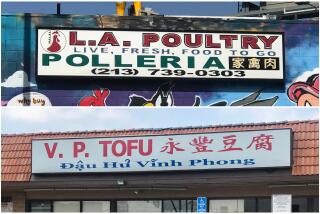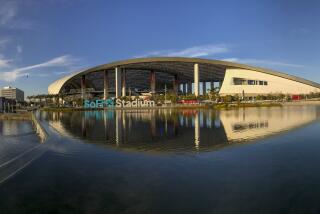For a White Couple, Greetings Met With Silence and Stares Marred the Egalitarian Image of Echo Park
All conversation ceases the moment I step outside. The men, who just a moment before were chatting in Spanish, now stop cold. They cast sidelong glances my way as I walk to my car. The glances are not friendly, not hostile, not lascivious. They are wary.
Here it is, a Wednesday afternoon, and they are home for lunch. I am clad in gym clothes. They have noticed that my hours as a writer and teacher are irregular. They have noticed, with even more disapproval, that sometimes my carpenter husband’s are as well. I remember enough college Spanish to know that they mutter to each other that it is just my husband and me here in this house. They wonder how we can afford it. Maybe we do something illicit on the side? After all, in their homes live extended families. Their houses are teeming with activity and noise; our house is ominously quiet.
“Hi,” I say, smiling, as I approach my car.
No reply. I get into my car, keeping the smile. But their scrutiny is beginning to irritate. Finally, as I put my car in gear, one speaks up.
“Hi,” he grudgingly replies, unsmiling.
I have lived in Los Angeles for 10 years, eight of them in Echo Park. My husband and I like Echo Park, feeling that we have the perfect compromise. Nearby are all the usual amenities of city life. Yet we wake in the morning to crowing roosters. The city skyline is clearly visible from our back yard, and so is the neighbor’s pet pig.
But then there were our two years on Lemoyne Street.
When we moved there, we ignored such signs as cars parked bumper to bumper on the street, graffiti-filled sidewalks, and the fact that we appeared to be the only Caucasians on the block. ‘Hey,” we told ourselves, “we know Echo Park.”
Another aspect that seemed a quintessential factor of Echo Park was the egalitarian mixture of ethnic groups going quietly about its business. Our neighbors were friendly but kept to themselves, as befitting both the need for privacy among people so closely living together and the need for community safety.
Sure, we knew about the gangs, the danger of walking through Elysian Park alone at dusk, the car thefts, the break-ins. Scary stuff, certainly, but no less a reality for any city neighborhood. And where else could you hear roosters while gazing at the skyline?
But on Lemoyne Street, the block between Logan school on Berkeley Avenue and the frankly gang-controlled corner of Effie Street, there were no roosters to be found. It was too packed with people. For example, behind our house and farther up the hill was a back house occupied by an ever-changing number of people who came and went all hours of the day and night. They were, as my Hispanic homeowner neighbors told me once the thaw lifted, a “bad set,” illegal immigrants not of the “right sort.” I did not feel free to make such a comment, though I had problems with them too: They were loud, messy and oblivious to the idea of personal space.
My other neighbors spoke harshly to them in Spanish and sometimes fights would break out. My husband and I unsuccessfully tried to negotiate with these people, asking them in broken Spanish to please clean up a ripped bag of garbage they left in front of our house. It and other such requests were ignored.
Meanwhile, we continued to be greeted with silence and stares whenever we stepped outside of our house. But our comings and goings were noted and commented upon. Finally, when they could see that we really didn’t have horns, a cautious truce prevailed. They decided we were not also a “bad set.”
But by then, we were tired.
We were tired of music suddenly blasting away at 2 a.m. We were tired of the knots of men who drank beer on the streets during the weekend, leaving their crumpled cans in the gutter. We were tired of battles over parking, over cars left in front of our garage, effectively locking us in. And not all this activity always came from the much-maligned “bad set.”
We were also tired of coping with the blatant prejudice.
In our neighbors’ eyes, we were suspect for months despite our well-tended home, our polite greetings. We were suspect because we were not Hispanic. We were suspect because we were in the minority. Just as my neighbors felt superior to the illegal immigrants, they also felt superior to us.
Much has been presented in The Times and other publications about the need for multiculturalism and acceptance among ethnic and racial groups. Usually such writings focus, in an admonishing way, on Caucasians. Whites are the snobs, the power elite jealously guarding their status, the majority unfairly suppressing the minority.
But let us not be so quick to point the finger, whatever ethnic and racial identity we claim for ourselves. It seems that many of us still have a pack mentality.
My husband and I now live on another street in Echo Park. What a difference a street can make.
Once again our neighbors are made up of a hodgepodge of various groups. Nobody seems dismayed that I am white or that the person in the side house is from Mexico, or that the lady down the street speaks only Korean. We incorporate a universal language: a smile, a nod of the head, a wave.
More to Read
Sign up for Essential California
The most important California stories and recommendations in your inbox every morning.
You may occasionally receive promotional content from the Los Angeles Times.









